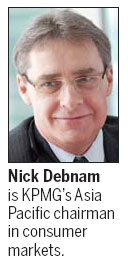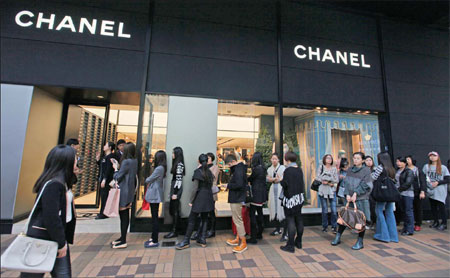Shopping elsewhere
Updated: 2013-02-01 09:14
By Lv Chang, Gao Changxin, Lin Jing and Chen Yingqun (China Daily)
|
|||||||||||
|
Shoppers from the Chinese mainland line up to buy Chanel products in Hong Kong. Many Chinese are increasingly buying luxury goods overseas. Provided to China Daily |
As prices of luxury items remain prohibitive in China, affluent consumers rack up sprees abroad
Wang Zhikuan, a 45-year-old man from Jilin province, is on one of his typical sprees. At Paris' Galeries Lafayette, an upper crust department store known in China as the "land of luxury goods", Wang is showing a shop assistant his laptop where he saved a photo of a Chanel bag that his friend wants him to buy.
"The price is good here," says Wang, who works for a media corporation in Beijing. "My friend made it clear about what she wants because it is an exclusive product that she can't find in China."
 |
This is one of several trips he'll take to Europe, specifically Paris, this year for both work and leisure. Each time, he spends tens of thousands of yuan shopping.
In what is close to sounding like a broken record, Wang and other affluent Chinese tourists, flaunting bags adorned with oversized logos from high-end brands such as Prada, Hermes and Louis Vuitton, are scouring the global havens of shopping such as Hong Kong, London, New York City and Paris for the latest and hottest in luxury goods.
During one recent afternoon in Paris, bystanders at Galeries Lafayette looked on seemingly in shock at the number of Chinese tourists running from one luxury store to the next.
This is quickly becoming a common occurrence for wealthy Chinese shoppers, especially during Chinese New Year early in the year or National Day in October. Both holidays last for at least a week in China, which turns shopping sprees into multi-day affairs.
But as the number of outbound Chinese shoppers increases, more are foregoing the domestic market for their purchases of luxury items.
A recent Bain report says a weaker euro coupled with an increasing number of Chinese tourists traveling abroad have pushed Chinese shoppers to make 60 percent of their total luxury purchases outside the Chinese mainland.
On Jan 22, according to an annual KPMG report, overseas travel among Chinese rose 71 percent in 2012, compared to a 53-percent increase in 2008. Seventy-two percent of them said they purchased luxury items during their overseas trips, with cosmetics, watches and bags the most popular items.
|
||||
"Most of them don't really have a budget," she says. "They have no problem with buying three to four pieces at a time."
Sales to Chinese tourists shopping overseas have grown 31 percent, according to the KPMG report, which accounts for nearly a quarter of luxury purchases around the world.
One of the main reasons is the high price of luxury goods in Chinese mainland - many retail at prices 30 percent higher in Chinese mainland than in Europe because of high tariffs on imported luxury goods. For example, a Hermes Birkin bag can be purchased at a 25-percent discount if it's purchased overseas.
The rise of individual tourism among wealthy Chinese is another key trend. Nick Debnam, KPMG's Asia Pacific chairman in consumer markets, says global brands need to pay attention to China's luxury consumers now more than ever.
"What we are now seeing is that the brands which are well positioned in China are receiving a boost in overseas markets from the emergence of a surging new class of traveling and well-off Chinese consumers," he says.
Besides avoiding the high prices for luxury items in China, many affluent Chinese, say analysts, are attracted to the experience of a shopping spree. According to a report by CLSA, a Hong Kong-based brokerage, there is a wider selection in the luxury item's country of origin. There also may be limited editions overseas for special occasions such as Valentine's Day or Christmas. Hermes in China, for example, does not have a central buyer, so their product offerings vary from store to store.
As many affluent Chinese change their shopping behaviors, they are also expecting more in terms of customer service in stores. Both Bain and CLSA point to the fact that global luxury brands need to adjust their marketing approach in China or face the prospect of not being able to keep up with the demands of the Chinese consumer.
Debnam from KPMG says that brands need a global strategy for Chinese consumers both internationally and locally.
"This means you will need a strong market position within China," Debnam says. "They also need the right product offering available in international stores."
Sage Brennan, co-founder of China Luxury Network, a forum for China's luxury sector, says "reaching the Chinese consumer is not just about launching retail locations in China".
"Chinese consumers have gone global and they expect brands to recognize their preferences and treat them appropriately," he says.
Related Stories
Old is the new new 2013-02-01 09:14
Authorized big deal 2013-02-01 09:14
Chinese brands struggle in luxury market 2013-01-28 07:21
Chinese travel overseas for luxury goods: survey 2013-01-23 16:01
Corruption curbs crimp luxury market 2013-01-17 03:25
Chinese deserve better overseas shopping experience 2012-12-26 10:38
Today's Top News
List of approved GM food clarified
ID checks for express deliveries in Guangdong
Govt to expand elderly care
University asks freshmen to sign suicide disclaimer
Tibet gears up for new climbing season
Media asked to promote Sino-Indian ties
Shots fired at Washington Navy Yard
Minimum growth rate set at 7%
Hot Topics
Lunar probe , China growth forecasts, Emission rules get tougher, China seen through 'colored lens', International board,
Editor's Picks

|

|

|

|

|

|








